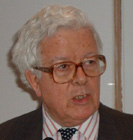Former British Foreign Minister Outlines China's Economic Potential
Geoffrey Howe, the Lord of Aberavon CH QC (Former British Deputy Prime Minister and Foreign Minister)
J. Sean Curtin (GLOCOM, Fellow and Asia Times)
In this article Geoffrey Howe briefly outlines why he believes China is the global economic dynamo of our time. He mentions some of the economic challenges that face China such as rising rates of unemployment and a bad-loans problem on the scale of Japan's non-performing loans crisis. Despite these immense challenges, Lord Howe is confident that China will overcome them.
 Geoffrey Howe, the Lord of Aberavon CH QC: Geoffrey Howe, the Lord of Aberavon CH QC:
[Economic progress] has transformed the lives of hundreds of millions of Chinese people so that they are beyond all recognition. It is a human revolution that has been taking place. A revolution that has launched China on the world stage as one of the unique economic dynamos.
I will not ply you with the economic facts about that, but you can determine this from one simple figure. The scale of Chinese exports to the United States, the trade surplus if you like, in 2002 was 103 billion US dollars. That is a huge contribution to the imports of the United States, but it is actually no larger than the Chinese share of the present US trade deficit. It is a huge component in world trade. Along side the scale of Hong Kong and Chinese investments in US government securities in the same year was 96 trillion dollars. So again, it is the immense linkage of China with the world economy. A trend repeated in the whole of ASEAN region and also with India.
Of course, I must remind you of the problems and challenges China faces. The threat of unemployment, hundreds of millions of people leaving the land to look for jobs, the need to tackle it and the dangers. The huge extent of loans to state enterprises and a significant number of non-performing loans as we call them from Japan's experience.
In response to these issues China is changing its economic structure. There is now a sustained shift taking place towards a market driven economy. The number of state-owned industrial businesses has shrunk over the last decade from over a 100,000 to under half that number. The number of private enterprises, which are measured in a different way, has trebled to almost 2.5 million.
There is a marvelous Chinese symbolism embodying this kind of change, in the policies adopted at the National People's Congress last year. Changes were made under President Jiang Zemin. He succeeded in turning an English verb into a Chinese noun. This was when he embodied into the changes in the Chinese constitution the word represent. The key to Chinese policy in the overall is the way it embodies this in the "Three Represents." Representing the Chinese people, number one; representing Chinese culture, number two; and representing the advanced forces of production, number three – code for private enterprise. So, the three represents.
I take a very special interest in this now. Because China's current president, as you well know, is President Hu, the prime minister is Premier Wen, so I think they should find a place for Howe.
The above comments were made at a China Connect Event at PricewaterhouseCoopers Embankment offices in London on 16 March 2004.
Profile: Rt Hon Geoffrey Howe, the Lord of Aberavon CH QC
Lord Howe served as a Cabinet Minister for nearly the entire period of Margaret Thatcher's Government. For four years (1979-83) as Chancellor of the Exchequer, six years (1983-89) as Secretary of State for Foreign and Commonwealth Affairs and, finally, as Deputy Prime Minister and Leader of the House of Commons (1989-9O). He retired from the House of Commons in the 1992 General Election and was awarded a Life Peerage, entering the House of Lords in July 1992. He is currently President of the Great Britain-China Centre.
| 




